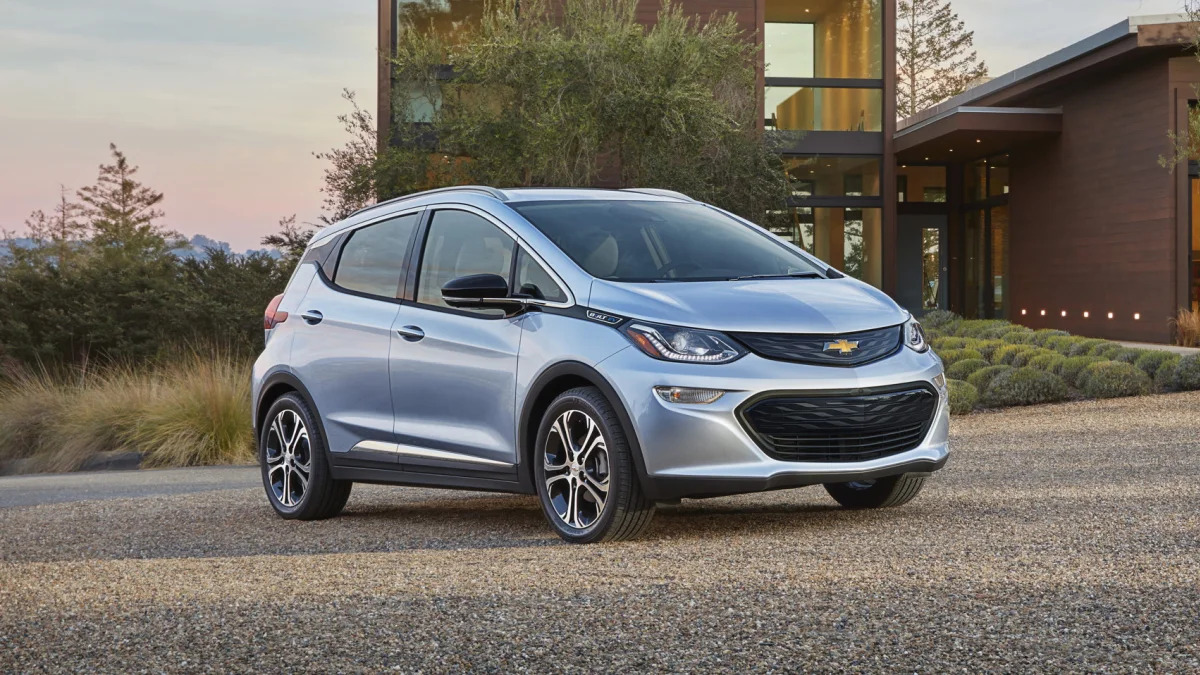When automakers come out with big, important, cutting-edge vehicles, it's not unusual for them to take a financial loss. When Chevrolet launched the first Volt, for example, Reuters reported the company lost vast sums on each vehicle it sold. And if a report from Bloomberg is correct, the Volt's new zero-emissions stablemate, the Bolt EV, is suffering from a similar problem.
Citing anonymous sources familiar with the matter, Bloomberg is claiming Chevy could lose $8,000 to $9,000 on each Bolt, based on the car's $37,500 starting price. While taking a loss on any product is surely a bitter pill for a company to swallow, in the auto industry, it's simply a cost of doing business in some of the largest members of the United States, like California and New York. And it's something that Bob Lutz talked about for the Volt back in 2008.
The governments in those states demand a percentage of an automaker's sales come from zero-emissions products – hitting those percentages while selling EVs at a loss is better than not being allowed to sell its products in some of the US' largest markets. But even if straight ZEV revenues stay in the red, there's a route for automakers like GM to make money – zero-emissions "credits."
California demands automakers have ZEV credits equivalent to 14 percent of its total vehicles sales – borrowing Bloomberg's example, that means GM needs 30,794 credits, or 14 percent of the 219,000 vehicles it sold last year. If an automaker fails to hit the 14-percent figure, it can buy extra credits from companies with extras. In the Bolt's case, each vehicle nets the General four credits, which means 7,700 sales could fulfill California's demands. That's particularly good news for GM, which bought fewer credits than any other automaker last year. If the Bolt is successful, it could not only push the company past the point of needing to buy excess credits, it could lead to extras. Ergo, profits. But spreadsheets alone can't explain the Bolt's importance.
While Chevy refused to give Autoblog a comment on Bloomberg's story, the brand's chief marketing officer, Tim Mahoney, told the business outlet that the Bolt is "a statement about what we can do for the Chevy brand." Its 238-mile range and $30,000 starting price (after Uncle Sam's $7,500 tax credit) brings a range-to-dollar ratio the likes of which the market has never seen.
It's also worth noting that losses on the Bolt are far below the questionable $49,000 per-vehicle loss Reuters reported on in 2012. That trend could continue, Bloomberg reports, as battery technology prices continue to drop, America's charging infrastructure grows, and the demand for EVs expands to major global markets like China.
With that in mind, the idea of Bolts costing GM money up front isn't so difficult to accept.
Citing anonymous sources familiar with the matter, Bloomberg is claiming Chevy could lose $8,000 to $9,000 on each Bolt, based on the car's $37,500 starting price. While taking a loss on any product is surely a bitter pill for a company to swallow, in the auto industry, it's simply a cost of doing business in some of the largest members of the United States, like California and New York. And it's something that Bob Lutz talked about for the Volt back in 2008.
The governments in those states demand a percentage of an automaker's sales come from zero-emissions products – hitting those percentages while selling EVs at a loss is better than not being allowed to sell its products in some of the US' largest markets. But even if straight ZEV revenues stay in the red, there's a route for automakers like GM to make money – zero-emissions "credits."
California demands automakers have ZEV credits equivalent to 14 percent of its total vehicles sales – borrowing Bloomberg's example, that means GM needs 30,794 credits, or 14 percent of the 219,000 vehicles it sold last year. If an automaker fails to hit the 14-percent figure, it can buy extra credits from companies with extras. In the Bolt's case, each vehicle nets the General four credits, which means 7,700 sales could fulfill California's demands. That's particularly good news for GM, which bought fewer credits than any other automaker last year. If the Bolt is successful, it could not only push the company past the point of needing to buy excess credits, it could lead to extras. Ergo, profits. But spreadsheets alone can't explain the Bolt's importance.
While Chevy refused to give Autoblog a comment on Bloomberg's story, the brand's chief marketing officer, Tim Mahoney, told the business outlet that the Bolt is "a statement about what we can do for the Chevy brand." Its 238-mile range and $30,000 starting price (after Uncle Sam's $7,500 tax credit) brings a range-to-dollar ratio the likes of which the market has never seen.
It's also worth noting that losses on the Bolt are far below the questionable $49,000 per-vehicle loss Reuters reported on in 2012. That trend could continue, Bloomberg reports, as battery technology prices continue to drop, America's charging infrastructure grows, and the demand for EVs expands to major global markets like China.
With that in mind, the idea of Bolts costing GM money up front isn't so difficult to accept.










Sign in to post
Please sign in to leave a comment.
Continue